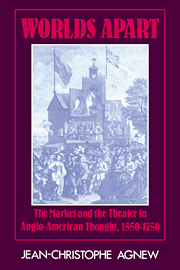2 - Another nature
Published online by Cambridge University Press: 16 November 2009
Summary
That, for which many their Religion,
Most men their Faith, all change their honesty,
Profit, (that gilded god) Commodity,
He that would grow damn'd rich, yet live secure,
Must keep a case of faces …
Thomas Dekker and John Webster, If It be not Good, the Devil is in It (1610–12)England's literate citizens steeped their response to the placeless market in mythological and magical allusions. But it is difficult to know what to make of these references when scholars themselves are at odds over the meaning and functions of mythical and magical thinking, even within the relatively stable confines of “primitive” societies. We are told by some anthropologists, for example, that myths are best understood as legitimating “charters” for the social institutions and practices of a particular culture and that magic serves as a propitiatory technology used by believers, albeit misguidedly, to control a world defined by myth. Now we have already seen that such definitions can shed light on the meanings with which various societies have, in effect, annotated the record of their exchange relations. Hermes was, after all, a divinity who embodied the equivocal character of the trade he was charged with protecting. Still, the illumination that these definitions offer is at best partial for early modern England, because the character and conditions of belief were themselves in flux. In the same measure that the English fell back on their mythical and magical resources to explain and order the social consequences of a burgeoning agricultural and commercial capitalism, those same resources were falling away before them.
- Type
- Chapter
- Information
- Worlds ApartThe Market and the Theater in Anglo-American Thought, 1550–1750, pp. 57 - 100Publisher: Cambridge University PressPrint publication year: 1986

